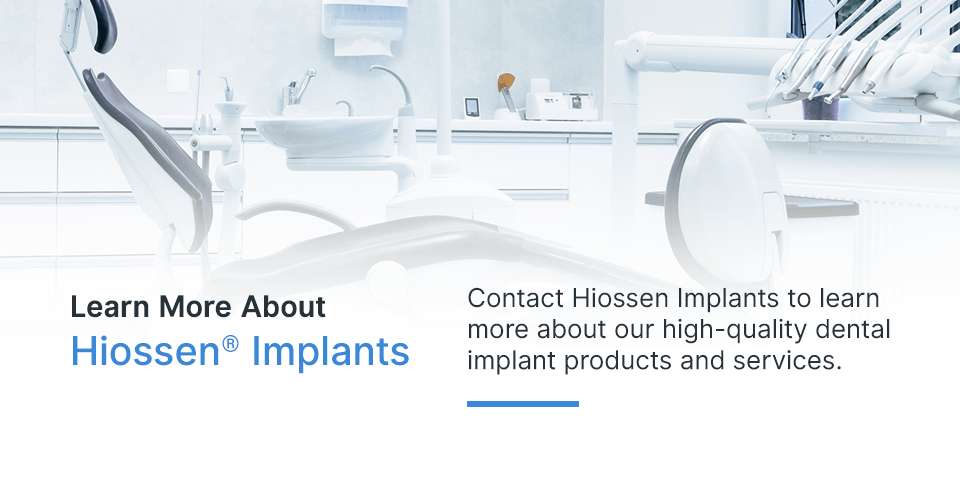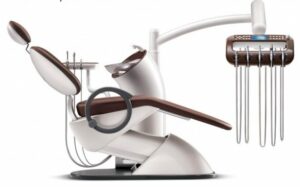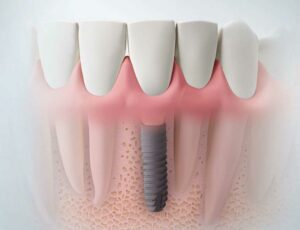Losing teeth can be a very disheartening experience. No one wants it to happen, but it’s more common than you may realize. Despite preventive measures like brushing, flossing and regular checkups at the dentist, millions of people lose their teeth every year. In fact, in America alone, more than 120 million people have lost at least one tooth, with that number only expected to grow in the coming years.
The field of dentistry has advanced by leaps and bounds in the last two decades, giving patients ample options for replacement teeth. Although nothing will ever be as good as our natural teeth, there are still a variety of choices that provide patients with an aesthetically pleasing appearance and functionality. However, no option is as effective at replacing missing teeth as dental implants.
Not only does the procedure have a high success rate, but implants look and act much more like natural teeth than any other replacement option. Although many patients are going through with the tooth replacement procedure, others still hesitate, asking themselves, “Do I need dental implants?” While considering this choice, it’s essential to speak to your dentist and do some research on the topic on your own.
If you’re still undecided about whether to pursue dental implants for your tooth loss, here, we will provide you with some information on how to know if you need a dental implant, and why it could be the best option for you. Although it may be more costly than other replacement teeth alternatives, the benefits of dental implants are astounding, and they could restore your smile in a way you never thought possible.
What Are Dental Implants?
Whether you’ve lost your tooth or teeth to age, decay or because of some kind of trauma, it’s essential to choose a replacement tooth procedure as soon as possible. Not only are there aesthetic concerns, with many patients not wishing to have a gap in their smile for any longer than necessary, but your oral health is also an issue. Leaving a space with no teeth creates several concerns with your alignment, your jawbone and more. Today, many dentists recommend dental implants as the best solution for tooth loss. But what does dental implant treatment entail?
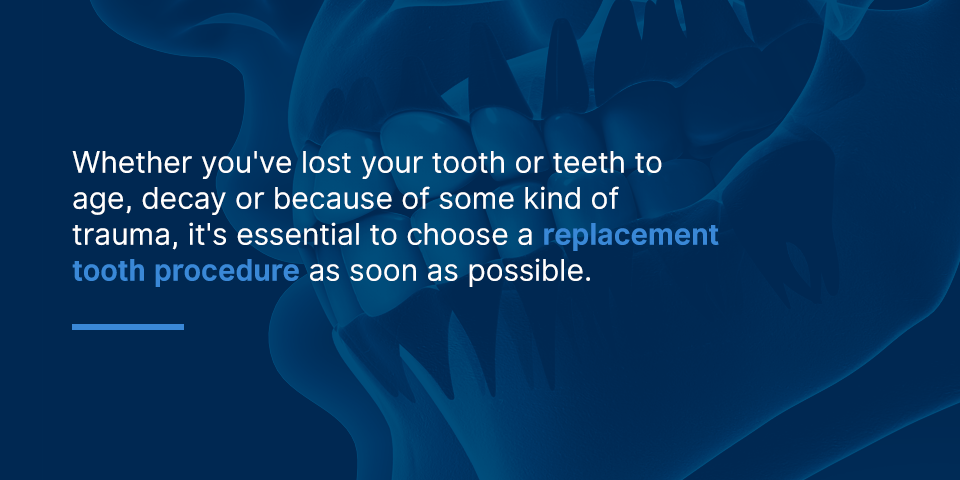
When a dental surgeon removes a tooth, they take it all, including the root. Dental implants are titanium posts surgically embedded into your jawbone, acting as a new root. The metal is the same as other replacement surgeries, like hip and knee replacements. Patients can rest assured this material is safe and effective.
Often, after inserting the post, clinicians wait several months for the bone and implant to fuse, a process called osteointegration. Once this happens, your dentist can move forward with the implantation process. They fasten an abutment which acts as a connector, then they attach the replacement tooth. The attachment between the implant and the crown or false tooth is usually screw-retained, but it can also be cemented. Therefore, it is impossible to remove replacement teeth.
The implantation process is a surgical procedure, and an oral health professional with experience and education in implantology should perform it. Even after decades of dental implant procedures becoming more commonplace, the vast majority performed in the U.S. continue to function and provide patients with optimal results.
Although most implant procedures still require patients to wait several months after the initial implant before inserting the abutment and replacement tooth, the field of implantology is advancing to the point that this extended wait period may no longer be necessary. As soon as they extract a tooth, a dentist can surgically place an implant in a procedure called immediate implant placement. Also, they can attach the abutment and replacement tooth during the same procedure, which is called immediate loading. By opting for this process, some patients do not have to deal with having a gap in their smile at all.
Common Signs You May Need Dental Implants
How do you know if you need dental implants? Certain dental issues are indications you may need dental implants, and the sooner patients can proceed with this option, the better their chances of reducing the risk of future dental complications. Here are some warning signs you need dental implants.

Missing One or More Natural Teeth
It may seem obvious, but if you are missing any of your natural teeth, you are a candidate for dental implantation. There are a variety of ways people lose their teeth.
- Non-restorable decay or cavity
- Severe gum disease
- Failed root canal
- Accidental trauma or damage
Whatever the cause, empty gaps in their smile make many feel embarrassed or self-conscious. But dental implants have the appearance of natural teeth and will fill the space where your extracted tooth was, blending in seamlessly.
Cracked or Broken Teeth
If you have cracked or broken one or more teeth, dentists usually try to save as much of the original tooth structure as possible. Unfortunately, in some cases, this is impossible. If the teeth become damaged beyond repair, your dentist will evaluate your individual situation and may recommend tooth extraction. After a dentist or oral surgeon removes one or more teeth, a dental implant is a possible option to consider.
Tooth Decay or Infection
Although dentists always strive to save the natural tooth whenever possible, some cases of tooth decay or infection make this impossible. If these issues have gone beyond a certain point where there isn’t another alternative, they will recommend an extraction. Once the tooth is out, though, you can get a dental implant.
Ill-Fitting Dentures
Another option for patients in need of replacement teeth is removable partial or full dentures, which denture adhesives generally hold in place. The main complaints many patients with dentures experience is that these appliances either become loose or they don’t fit properly. Dealing with this daily is not just an annoyance, but it can also cause mouth and gum irritation. That’s why many patients who’ve had dentures in the past are switching to longer-lasting dental implants.
Negative Side Effects of Tooth Loss
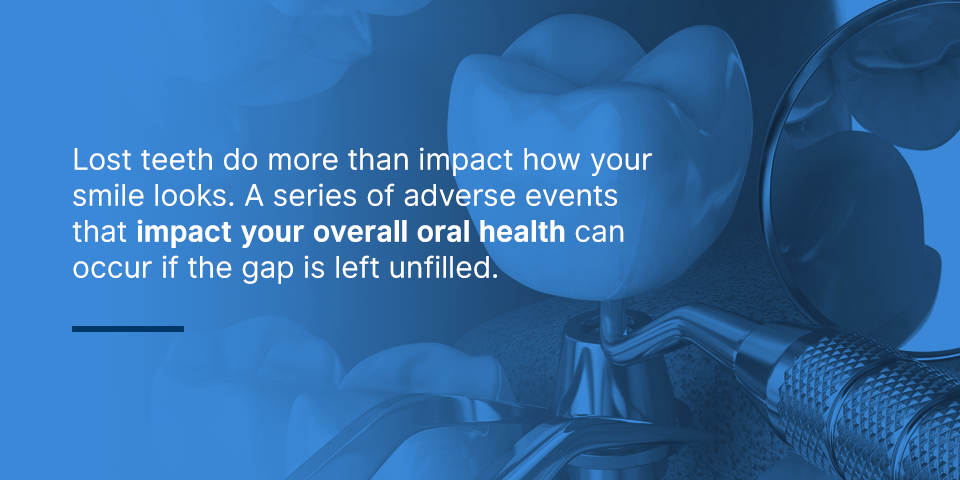
Lost teeth do more than impact how your smile looks. A series of adverse events that impact your overall oral health can occur if the gap is left unfilled. Patients should be aware doing nothing could have serious repercussions, such as the following.
- Shifting teeth: Teeth adjacent to gaps tend to shift or tilt toward the empty space. That causes neighboring teeth to become unstable and can lead to a misaligned bite. Dental implants fill the gap and prevent this shift from occuring.
- Sore spots: Teeth in the opposing jaw tend to grow up or down when there is a gap, as if trying to make contact with the tooth that’s no longer there. If they encounter gum tissue instead, this can lead to persistent discomfort and even a sore spot. Dental implants give the teeth on the opposing jaw a point to connect to.
- Decreased bone density: Under normal conditions, the chewing process stimulates the jawbone because the roots of teeth sit within it. Without this stimulation, it can shrink during a process called resorption. It’s difficult to regain lost jawbone volume, and it can even cause a person’s facial features to appear sunken. Dental implants stimulate bone growth as natural teeth do, and can prevent these side effects if dentists insert them early enough.
Other Options for Missing Teeth
Even though dental implants have many unique advantages, they are not the only option dentists can provide if you lose your teeth. The most common teeth replacement solutions available besides implants are dental bridges and dentures. These two choices are very different than an implant procedure. So, before running to your dentist for dental implants, here are some highlights of what to expect from these two other options.
Dental Bridges
Dental bridges are the primary option in dentistry when it comes to tooth replacement. Also called a fixed bridge, it involves shaving the teeth on either side of the gap down so the dentist can cement abutments, or anchors, over them. Then, they attach a fake tooth between the two natural teeth within the gap the abutments have secured.
This method provides a few benefits, such as preventing adjacent teeth from shifting and giving an aesthetically pleasing appearance. However, there are disadvantages for patients to be aware of.
- Dental bridges do not prevent resorption, meaning bone loss can continue unabated.
- Over time, bone and gums diminish and can create a space that traps food particles.
- The natural tooth with the attached abutment often succumbs to tooth decay, which can lead to additional tooth removals.
- The bridge needs replacement, which is not the case with permanent dental implants.
Dentures
Another common option for tooth replacement is the use of partial or full removable dentures. This is a more affordable option than both dental bridges and implants, and it involves a removable plate specially fabricated to fit within the patient’s mouth. Often, people use dental adhesive to secure their dentures, but it may also include clasps to secure the device to any remaining teeth. Many patients prefer the fact that it’s the least invasive option for replacement teeth. However, there are many downsides to using dentures.
- The lack of force on the jawbone leads to resorption and can give wearers’ facial features a sunken appearance.
- As jaw shrinkage occurs, dentists frequently need to refit or remake new dentures.
- The clasps attached to remaining natural teeth can cause damage to them and nearby gum tissue.
- Their instability and the fact that they move can cause sores to develop on the gums.
- Some experience difficulty speaking, chewing or smiling with confidence.
Why Implants Are the Best Option
There’s a reason implants are growing in popularity. Not only are they a practical option, but they also provide aesthetic and oral health benefits to patients. There are a few negative aspects of dental implants, including the time it takes to complete an implant procedure, the cost associated with it and the fact that patients have to undergo surgery to get implants placed. However, when compared with other options, like dental bridges and dentures, there are fewer disadvantages.

Whether your dentist is planning an extraction or you already have lost teeth, dental implants offer many advantages patients should be aware of when considering their options.
- They look and behave more like natural teeth, allowing patients to talk and eat normally.
- Implants prevent oral health issues like jawbone shrinkage and shifting teeth.
- They have a long lifespan, not requiring replacement as often.
- You can brush and floss them like natural teeth, and they won’t trap food like other options.
- Replacement teeth are durable, so there are no food restrictions.
- Implant procedures are becoming easier than ever.
Reasons Patients Avoid Getting Dental Implants
Even when patients learn the advantages of getting dental implants, they often make excuses about why they shouldn’t go forward with the procedure. However, if you know this option will benefit you, it’s important to address your concerns with your dental health professional. Here are some of the most common reasons patients give for why they can’t get dental implants.
- Too old: Many elderly patients feel they’re too old to undergo a dental implantation. However, just because you’re of a certain age, that doesn’t mean you won’t benefit from having a full set of teeth. You should be able to enjoy your golden years with the best replacement teeth available.
- Don’t deserve replacement teeth: Some patients are ashamed they didn’t take better care of their natural teeth, so they believe they don’t deserve a beautiful replacement smile. If you qualify for dental implants and you’re willing to take good care of them, nothing should stop you from moving forward.
- Implants are too expensive: It’s true the cost of dental implants is, in general, higher than that of bridgework or dentures. However, because they are longer-lasting, this cost is subjective. A beautiful smile is an investment every patient deserves.
- Afraid of the dental procedure: The implantation process is oral surgery, which means there may be associated risks and possible pain or discomfort. However, your dentist will review these potential risks with you ahead of time and will do everything in their power to alleviate any discomfort.
- Missing tooth not a bother: Some patients who have lost a tooth in the back of their mouths don’t pursue any tooth replacement options because it doesn’t bother them. However, keep in mind leaving that open gap subjects you to the oral health complications mentioned above.
Next Step to Getting Implants
No matter what stage you’re in, it’s never too late to start a conversation about dental implants with your dentist. Maybe you have a dental bridge or dentures, and you’re looking for a longer-lasting, effective tooth replacement method. Or, perhaps you’re about to have a dentist extract a tooth, and you’re deciding which type of replacement option is right for you. With the many advantages they offer, be sure to mention your interest in dental implants to your dentist or oral surgeon.
Learn More About Hiossen® Implants
If you’re a clinician, you know how important a high-quality implantation system is to your business. Contact Hiossen Implants to learn more about our high-quality dental implant products and services. Or, find a representative in your area using our zip code tool.
